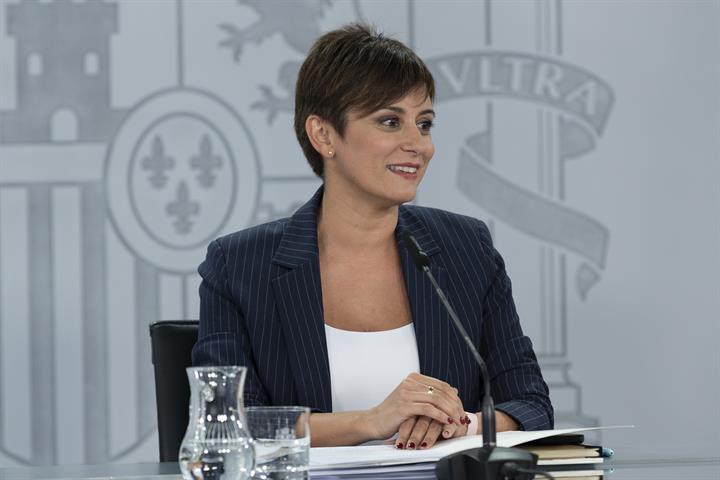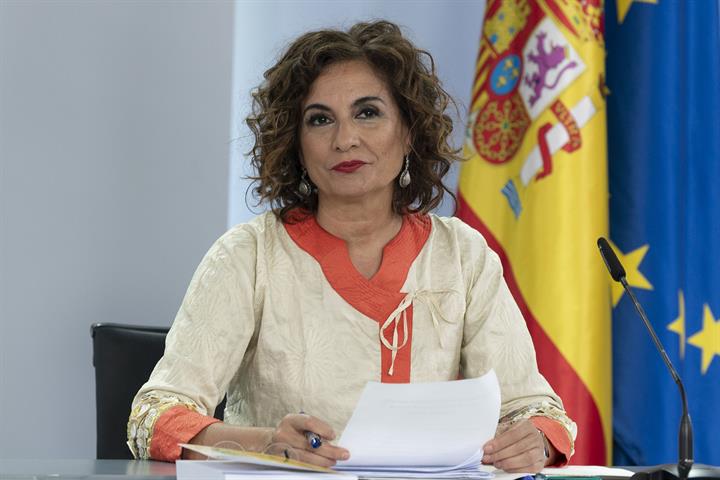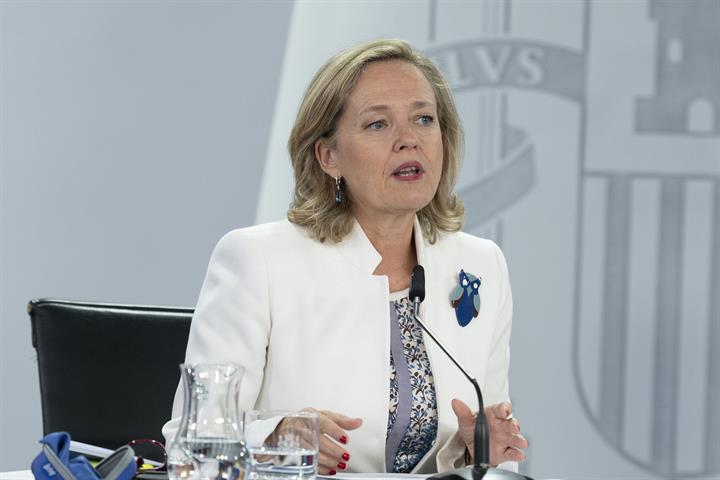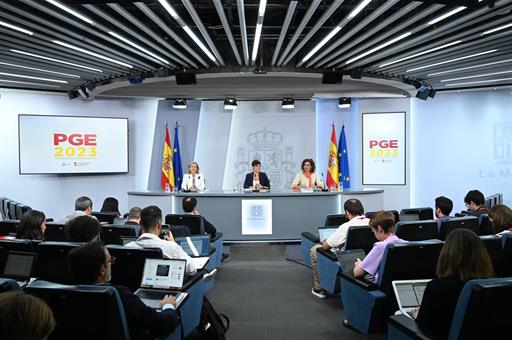Council of Ministers
The Government of Spain approves the draft General Budget for 2023
Council of Ministers - 2022.10.4
Moncloa Palace, Madrid
The Council of Ministers has approved the General State Budget Bill (PGE) for 2023, which will be sent to the Lower House of Parliament for debate, amendment and approval.
The Minister for Treasury and Public Function, María Jesús Montero, has expressed her confidence that the lower house will approve this third budget of the legislature, as was the case in 2021 and 2022. Montero stated that these public accounts offer security and stability at a time of great uncertainty caused by the war in Ukraine, are a guarantee for the middle and working classes, strengthen the welfare state and will allow the consolidation of economic growth and the great ecological, digital and productive model transformations that are being carried out throughout the legislature.
The First Vice-President of the Government of Spain and Minister for the Economy and Digital Transformation, Nadia Calviño, presented the new macroeconomic scenario included in the Draft Bill, pointing out that the principles of prudence, fiscal responsibility, social justice, modernisation and economic efficiency are complied with, and that the budget responds "to the urgent without losing sight of the important".
For her part, the Government Spokesperson and Minister for Territorial Policy, Isabel Rodríguez, said that the aim of the new budget is to reassure citizens, to restore people's dignity and to bring social cohesion to the country so that it is "better, more modern, sustainable, green and egalitarian".
Rodríguez has announced that the President of the Government of Spain, Pedro Sánchez, will appear at his own request in Upper and Lower Houses of Parliament to explain both the consequences of the war in Ukraine and the decisions taken, and to present the budgetary, economic and fiscal measures being promoted by the Executive.
 The Government Spokesperson and Minister for Territorial Policy, Isabel Rodríguez, during her speech at the press conference after the Council of Ministers | Pool Moncloa/Borja Puig de la Bellacasa
The Government Spokesperson and Minister for Territorial Policy, Isabel Rodríguez, during her speech at the press conference after the Council of Ministers | Pool Moncloa/Borja Puig de la Bellacasa
Record social spending and increased revenues
The Treasury Minister, María Jesús Montero, explained that the total non-financial spending limit contemplated in the draft law reaches 198.221 billion euros, "the highest figure ever recorded", which includes the European funds from the Recovery, Transformation and Resilience Plan.
However, she continued, if these funds are not included, the spending ceiling is still at "an unprecedented level in budgetary history", at 173.065 billion euros.
Six of every ten euros are earmarked for social spending, with a total of 266.719 billion euros - or 274.445 billion euros if European funds are included -, also "the highest figure ever recorded for these items".
For example, dependency care will receive 3.522 billion, 150% more than at the beginning of the legislature. The health budget increases by 6.7%, particularly focused on strengthening primary care and mental health, and housing policies will receive 3.472 billion euros.
With regard to the revenue budget, the Treasury Minister detailed that the increase in non-financial revenue is 6% higher than the forecast for 2022, an improvement that is explained "fundamentally by economic growth". With regard to the reform and establishment of new taxes, she referred to the information already provided last week at a specific press conference.
Likewise, although the Lower House backed the Government's proposal to continue the suspension of the stability and debt targets and the expenditure rule for the following year on 22 September, the Government's target is for the public deficit to be around 3.9%, a significant decrease from when it was over 10% in 2022.
Main new items in the PGE 2023
 The Minister for Treasury and Public Function, María Jesús Montero, during her speech at the press conference after the Council of Ministers | Pool Moncloa/Borja Puig de la Bellacasa
The Minister for Treasury and Public Function, María Jesús Montero, during her speech at the press conference after the Council of Ministers | Pool Moncloa/Borja Puig de la Bellacasa
First contribution to the pension piggy bank in 13 years
The pensions item is being increased to cater for new pensioners and the annual revaluation, which will be carried out in accordance with the year-on-year CPI recorded up to November, which the minister has calculated to be around 8.5%.
In addition, for the first time in 13 years, a contribution of 2.957 billion euros from the Intergenerational Equity Mechanism will be made to the Social Security reserve fund - the "pension piggy bank". This is being done, the Treasury Minister stressed, "without increasing the deficit of this sub-sector" and is possible thanks to the increase in the Minimum Basic Wage (SMI), the improved composition of employment and its stability - the result of the labour reform - and the good management of the Social Security itself.
Public employees
Staff spending will reach 20.052 billion, an increase of 6.6%, mainly due to the 2.5% wage increase agreed for public employees for next year. Depending on how inflation and growth evolve, the Treasury Minister has indicated that the pay rise could be increased by an additional point.
Young people
Spending on education increases 6.6%. Grants for students amount to 390 million euros more than in 2022 and a budget of 2.474 billion euros is set aside for equal opportunities for talent, "so that no young person is left without going to university or studying vocational training because their family income prevents them from doing so", highlighted María Jesús Montero.
The minister also announced that 50 million euros will be transferred to universities to create 1,000 more places for first-year medical students.
The youth rental voucher will be maintained, with an allocation of 200 million, and a new plan for affordable rents will be launched with 260 million.
Free Renfe Passes in 2023
Montero announced that the subsidy and free travel on Cercanías, Rodalies and medium-distance state-owned trains will be maintained throughout 2023. Some 1.5 million season tickets have already been issued since the measure came into force, initially on a temporary basis, in September.
More than 10 billion euros for investment
The spending item that will see the largest increase in 2023 is chapter 6 on Real Investments, which, for the first time in history, exceeds 10 billion euros. Specifically, including European funds, it will increase from 8.9 billion euros in 2022 to 11.867 billion euros, an increase of 33.1%. "If those funds were not included, this amount would be 28% more than in the previous year, so with the effort of the national budget we are also trying to boost our productive fabric and investment", said Montero, who claimed the role of the public sector as a driving force in this sense.
57.4 billion for the change of production model
Economic actions will also have a record budget, up to 57.4 billion euros, of which 30 billion euros will come from the Recovery Plan and from the last annual instalment of the REACT-EU programme. This section includes Agriculture, Industry, Energy, Trade, SMEs and R&D, among others.
Reduction in unemployment spending
The Treasury Minister ended the list of the main spending items by highlighting that only two items were being reduced. The first is spending on unemployment benefits: "Never before in Spain have there been so many people working and this means that we are achieving higher tax revenues for some taxes and we are spending less on benefits.
Fewer resources are also allocated to the Regional Liquidity Fund (FLA), which finances the deficits of these administrations. In 2023, 135.273 billion euros is earmarked for payments on account to the regional governments and local entities.
New macroeconomic scenario
 The First Vice-President of the Government of Spain and Minister for the Economy and Digital Transformation, Nadia Calviño, during her speech at the press conference after the Council of Ministers | Pool Moncloa/Borja Puig de la Bellacasa
The First Vice-President of the Government of Spain and Minister for the Economy and Digital Transformation, Nadia Calviño, during her speech at the press conference after the Council of Ministers | Pool Moncloa/Borja Puig de la Bellacasa
The First Vice-President of the Government of Spain and Minister for the Economy and Digital Transformation, Nadia Calviño, has reviewed the main aspects of the new macroeconomic scenario included in the General State Budget Bill.
Calviño stressed that all indicators show that the Spanish economy is so far on a path of strong and sustained growth and that there are no signs of economic slowdown.
Specifically, and being cautious, Calviño explained, growth in 2022 as a whole is expected to be 4.4%, although the September data points to even stronger growth. For 2023, the forecast is moderated to 2.1%, due to current international uncertainty. However, with respect to the eurozone and the main developed countries, Spain will maintain above-average growth levels in 2022 and 2023, according to the estimates of the main national and international organisations.
Inflation, which Calviño has defined as the "main challenge currently facing our economy", has begun to fall, and with the advance data for September, it has reached around 9%. In terms of the harmonised CPI at a European level, Spain is already below the inflation in the euro area, both YoY and MoM, and twelve eurozone countries have higher inflation rates than Spain.
Labour reform and recovery plan, key issues
The Vice-President referred to the labour reform and the investments of the Recovery Plan as the main causes of the structural change taking place in the Spanish economy.
Currently, the unemployment rate is around 12%, there are fewer than 3 million people unemployed and fewer than one million households (990,300) where all people are unemployed. "This is a very important figure that shows the positive structural impact of the labour reform", reiterated Calviño, who expressed her confidence that by the end of 2023 there will be almost 21 million people in employment and the unemployment rate will be below 12%.
The Recovery Plan's investments and reforms will increase GDP by 2.6 percentage points on average per year until 2031 by boosting activity, quality employment, investment, innovation and productivity.
Non official translation





